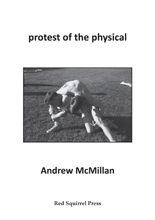 I’ve woken up with protest of the physical running through my mind. McMillan has a voice which surprises you, and a deep poetic theory behind the voice. It is almost as if I’m surprised – even after the wonderful the moon is a supporting player – walking into a room and finding this poet there, because the ‘rooms’ are so crowded these days. But McMillan stands alone, even when you hear Thom Gunn – say – singing in the subtext. I’m sure I was partly moved because I remember so vividly buying The Sense of Movement about a thousand years ago, when I was a boy, and stumbling upon a poem about Elvis – did poets know about Elvis too, I thought! This is remarkable stuff, making strange as the early Gunn made strange, and with a gift so lightly worn you might easily miss just how deep it is.
I’ve woken up with protest of the physical running through my mind. McMillan has a voice which surprises you, and a deep poetic theory behind the voice. It is almost as if I’m surprised – even after the wonderful the moon is a supporting player – walking into a room and finding this poet there, because the ‘rooms’ are so crowded these days. But McMillan stands alone, even when you hear Thom Gunn – say – singing in the subtext. I’m sure I was partly moved because I remember so vividly buying The Sense of Movement about a thousand years ago, when I was a boy, and stumbling upon a poem about Elvis – did poets know about Elvis too, I thought! This is remarkable stuff, making strange as the early Gunn made strange, and with a gift so lightly worn you might easily miss just how deep it is.
The texture of McMillan’s world is easy enough to recognise and acknowledged in the notes: quotations from Ivor Gurney and Virginia Woolf jostle with Thom Gunn’s Collected Poems and Tadeuz Rozewicz’s recycling. The physical of the title demands our fullest attention, from Virginia Woolf’s “I have to bang my hand against some door to bring myself back to the body”, to Thom Gunn’s affirmation that “he will live / here, morning by morning”. It is research into Gunn’s letters which took McMillan from Barnsley to Berkeley University, and a rich word-horde of imagery comes from the journey, whether of “the day chasing its own shadow” on Shambles Street in Barnsley or the graffiti of Ocean Beach in San Francisco, and the poet’s laconic, American accented “don’t be afraid / to put ya toes / in the sand”.
But what is most moving about protest of the physical is the conversation going on between the images. If I’m right in thinking there is a theory between the lines of the poems, it may be to do with how we love, and prevent love, “how thin the membranes that we build / between each other”. This is definitely something to do with the dualism which separates mind and body, so that “we’ve confused happiness / with someone being able to say our name to us” and “half the people here only know the outside / exists because they talk to it through / high strung wires while they dream / of being recognised on the street”. The ‘here’ is of course everywhere, and when “a crowd gathers” to see whether a man will commit suicide, “some are concerned / a few shout encouragement most / just want to see what happens when the man jumps”.
This might sound like a bleak world, but it doesn’t feel like that. And the feeling is in the poetry, if I may make an artificial distinction. The poetry hints at transcendence, even if only as something we all hope for. What the waiting crowd “want to see” is the victim’s arms “grasp the invisible ladder his elation … his regret” because it is such invisible ladders that occupy our own dreams. Love is obviously at the heart of this, and most obviously accounts for the ghost of Thom Gunn haunting protest of the physical. The Gunn of Touch and The Man with the Night Sweats. “I could have / I should have tried harder” McMillan says in the final lines of his new pamphlet, yet his language makes a quite exquisite, sometimes Pinteresque music of love with perfectly pitched cadences of speech: “there are days / when I don’t miss you . . . or even love you / that much . . . anymore”; frightening but brilliant imagery of “the wheezing orchestra of the future”; physical intimacy “which means knowing / the exact taste of someone else’s / sleep in their mouth on waking”; and a vigorous tenderness we haven’t heard since the seventeenth century: “your kiss was deep enough to stand in”. “Read this. Then read it again and again” Helen Mort said in her own review. One waits with wonder to see where Andrew McMillan’s first full-length collection will take us.
Order your copy of Andrew McMillan, protest of the physical (Red Squirrel Press, 2013) pp.27, £5.00p. HERE
